
People watch a live broadcast of the exit poll results for the 2024 U.S. presidential election in Times Square in New York City, the United States, on November 5 (XINHUA)
1 The Year of Global Elections
In 2024, voters in more than 60 countries went to national polls.
One of the most notable elections was the political resurgence of U.S. Republican Donald Trump, with his party also securing majorities in both the House and the Senate. The results will not only determine the future policies of the world's largest economy but also impact the international political landscape.
Last year, more than 20 regional and national elections were held across Europe but many resulted in fragmented parliaments and fragile governing coalitions. The broader fractures and rising far-right influence on the continent reflect years of accumulated voter frustration over economic stagnation, escalating migration pressures, and the enduring strain of regional conflicts.
In other parts of the world, 2024 also turned out to be a difficult year for incumbents and traditional political parties with many of them experiencing a decline in support due to issues such as poor economic performance and corruption, among others.
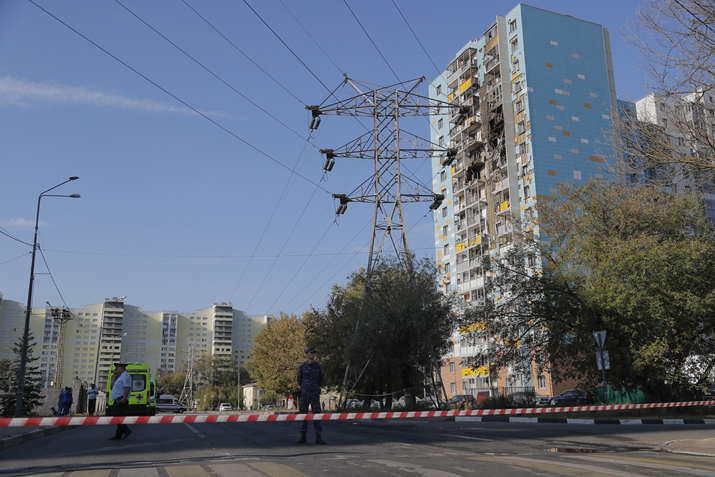
A damaged building after a reported Ukrainian drone attack in Ramenskoe, Russia, on September 10 (XINHUA)
2 Prolonged Russia-Ukraine Conflict
The Russia-Ukraine conflict continued in 2024, impacting global geopolitics and regional stability. Russia's intensified military operations in east Ukraine led to renewed sanctions from Western nations, while Ukraine received increased support from NATO and its allies.
Diplomatic efforts to de-escalate the situation were persistent throughout the year. In September, China, together with Brazil, Algeria, and other members of the Global South, established the Group of Friends for Peace on the Ukraine crisis.
At the second meeting of the group in New York City, the U.S., in December, representatives from 17 Global South countries, including China, Brazil, Algeria, South Africa and Türkiye, restated the need to observe principles for de-escalation and the importance of non-expansion of the battlefield and non-intensification of fighting. They called for support for a comprehensive and lasting settlement by the parties to the conflict through diplomacy and political means based on the UN Charter and international law, and supported countries from the Global South in playing a constructive role to this end.

Palestinians receive food relief in the Jabalia refugee camp in north Gaza Strip on August 29 (XINHUA)
3 Middle East Crisis Escalation
In 2024, the Middle East experienced a significant escalation of crises.
The Hamas-Israel conflict centered in the Gaza Strip intensified. According to Gaza-based health authorities, since the outbreak of the conflict in October 2023, the Palestinian death toll from ongoing Israeli attacks in the area has topped 45,000. Despite international efforts to bring an end to the humanitarian catastrophe, a ceasefire deal still seems far off.
The clashes have also spilt over to multiple countries in the region and involved Hezbollah in Lebanon, the Houthis in Yemen and some groups in Iraq. Additionally, two rounds of direct military conflicts between Iran and Israel nearly sparked a regional war.
The situation in Syria underwent a dramatic shift in December. A coalition of military groups, led by Hayat Tahrir al-Sham, waged a major offensive from north Syria beginning on November 27, sweeping southward and capturing the capital Damascus within 12 days. The fall of Bashar al-Assad's government brought a surprise end to the nearly 14-year Syrian civil war, adding to uncertainties for both the war-torn nation and the broader Middle East.
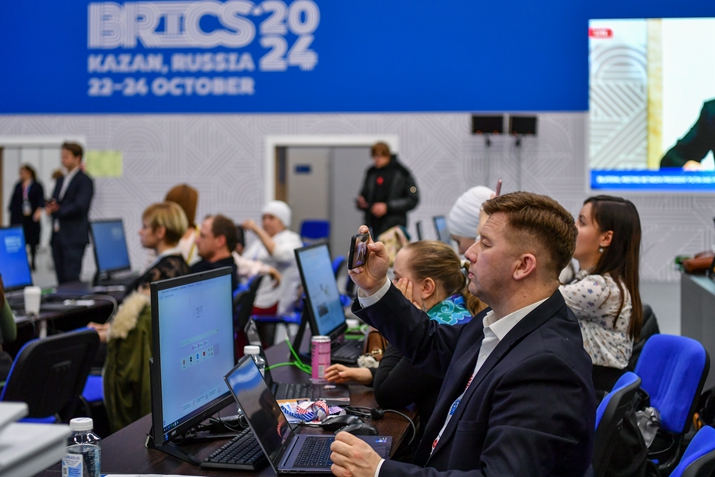
Media representatives at work in the BRICS Summit press center in Kazan, Russia, on October 22 (XINHUA)
4 BRICS Expansion
BRICS, originally consisting of Brazil, Russia, India, China and South Africa, welcomed new members in January. In its latest expansion, Egypt, Ethiopia, Iran, Saudi Arabia and the United Arab Emirates were invited to become members of the group of emerging economies.
Following the enlargement, the bloc now accounts for nearly half of the world's population and one fifth of global trade. Calculated by purchasing power parity (PPP), its combined economic output now surpasses that of the Group of Seven (G7). This enhanced economic and demographic strength elevates BRICS' standing in global governance and underscores its role as a driving force behind multipolarity and the democratization of international relations.
The enlarged BRICS also creates new opportunities for cooperation and growth among Global South nations. The inclusion of new members brings diverse resources, expanded markets, and shared priorities, particularly in critical areas such as energy security, infrastructure development, and agricultural innovation.
In October, the BRICS summit in Kazan, Russia, decided to establish a new category of affiliation, BRICS partners. Indonesia, Malaysia, Thailand, Belarus, Bolivia, Cuba, Kazakhstan, Uzbekistan and Uganda have been designated as BRICS partners since the conclusion of the summit.

Smoke in the colors of the French flag rises during the opening ceremony of the Paris Olympics on July 26 (XINHUA)
5 Paris Olympics and Paralympics
The Paris 2024 Olympic Summer Games, running from July 26 to August 11, celebrated the return of the Summer Olympics to Paris after a century.
Some 10,500 athletes from more than 200 countries and regions participated in Paris 2024. It was also the first time in Olympic history that male and female athletes each represented 50 percent of the participants.
At the closing ceremony, International Olympic Committee President Thomas Bach lauded the athletes' extraordinary performances, celebrating how they demonstrated "the greatness humans are capable of."
The Paris 2024 Paralympic Games took place from August 28 to September 8, with the participation of around 4,400 athletes from a record 168 delegations.
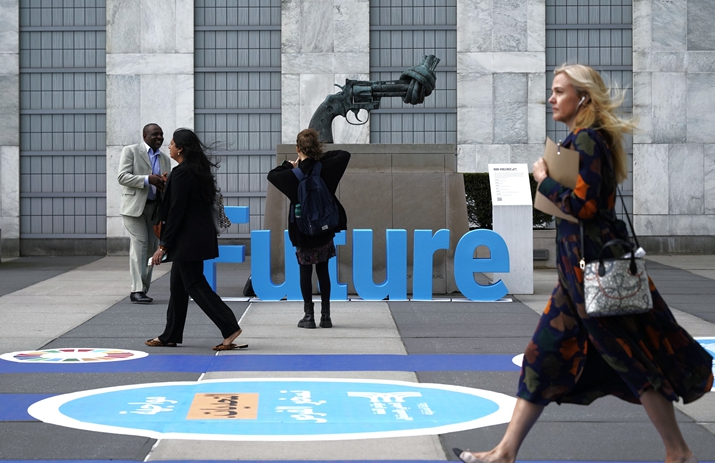
Participants at the site of the UN Summit of the Future in New York City, the United States, on September 23 (XINHUA)
6 Collaborative AI Governance
The UN Summit of the Future, held in New York City, the U.S., on September 22-23, adopted the Global Digital Compact, a comprehensive framework for global governance of digital technology and artificial intelligence (AI).
Earlier in June, the UN General Assembly adopted a resolution proposed by China and co-sponsored by more than 140 countries on strengthening international cooperation in the capacity-building of AI.
China subsequently proposed the AI Capacity-Building Action Plan for Good and for All, and promoted the establishment of the Group of Friends for International Cooperation on AI Capacity-Building at the UN.
On December 19, at a UN Security Council briefing on AI, UN Secretary General António Guterres said rapid developments in AI are outpacing humanity's ability to govern it, raising important questions about accountability, equality, safety and human oversight in decision-making.
Also at the meeting, China's permanent representative to the UN Fu Cong stressed that the AI technology is not a pie to be divided among a small group of people, nor should its global governance be determined by just a small number of countries.
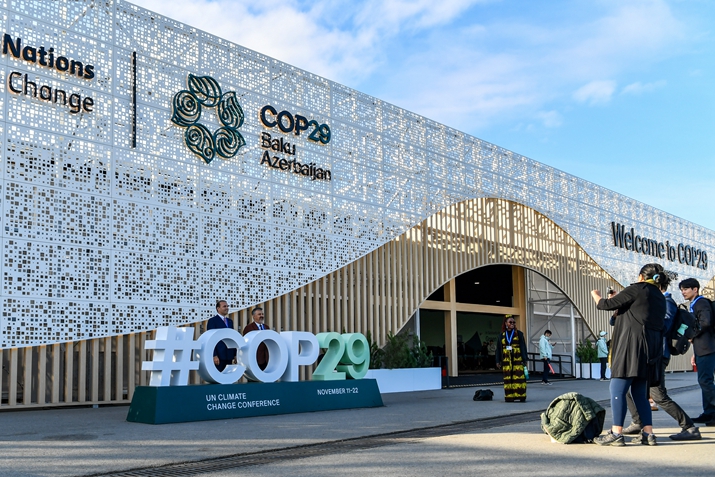
The entrance to the venue of the 29th Conference of the Parties to the UN Framework Convention on Climate Change, known as COP29, in Baku, Azerbaijan, on November 15 (XINHUA)
7 Global Climate Action
The 29th Conference of the Parties to the UN Framework Convention on Climate Change (COP29) was held in Baku, capital of Azerbaijan, from November 11 to 22. The conference aimed to advance global climate governance and accelerate the implementation of the goals of the Paris Agreement.
A major highlight was the international consensus on post-2025 climate finance targets. Developed nations committed to providing at least $300 billion annually to developing countries by 2035.
COP29 adopted additions to the Paris Agreement, enabling countries to meet their climate goals through carbon credit trading, a step that facilitates the establishment of a global carbon market. Furthermore, the conference reinforced the importance of transparency, requiring nations to submit biennial transparency reports detailing their efforts to combat climate change.
While COP29 did not finalize all climate funding targets as initially planned, its resolutions and agreements laid a foundation for future global climate efforts.
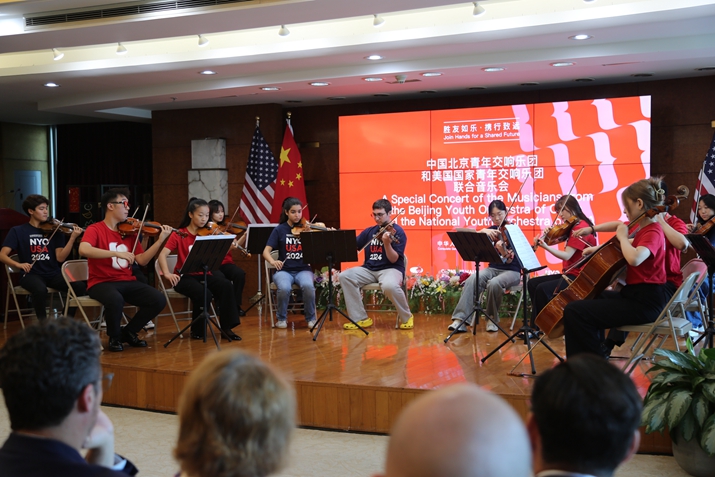
Musicians from the Beijing Youth Orchestra of China and the National Youth Orchestra of the United States of America perform together at the Chinese Consulate General in New York City, the United States, on August 6 (XINHUA)
8 Overall Stability of China-U.S. Relations
On November 16, Chinese President Xi Jinping met with U.S. President Joe Biden at Biden's request on the sidelines of the Asia-Pacific Economic Cooperation Economic Leaders' Meeting in Lima, Peru. The leaders focused on advancing dialogue, fostering cooperation, and effectively managing differences during the U.S. government transition. They also addressed regional and international issues of mutual interest, charting a constructive course for the future of bilateral relations.
In a congratulatory message to U.S. President-elect Donald Trump on November 7, President Xi expressed the hope that the two sides will uphold the principles of mutual respect, peaceful coexistence and win-win cooperation, strengthen dialogue and communication, properly manage differences and expand mutually beneficial cooperation.
In 2024, China and the United States held two rounds of strategic communication and five meetings of the bilateral Financial Working Group and the Economic Working Group, respectively. The two sides advanced practical cooperation including counternarcotics, law enforcement and climate change, extended their science and technology agreement, and co-signed each other's resolution on artificial intelligence at the UN General Assembly. Nearly 15,000 young Americans visited China through the initiative of inviting 50,000 young Americans to visit China in the next five years, announced by President Xi in November 2023.
In the meantime, China has firmly safeguarded its sovereignty, security and development interests, and opposed the illegal and unreasonable suppression by the U.S. side. In particular, with regard to the U.S.' gross interference in China's internal affairs such as Taiwan, China has resolutely defended its legitimate rights and interests and safeguarded the basic norms governing international relations.
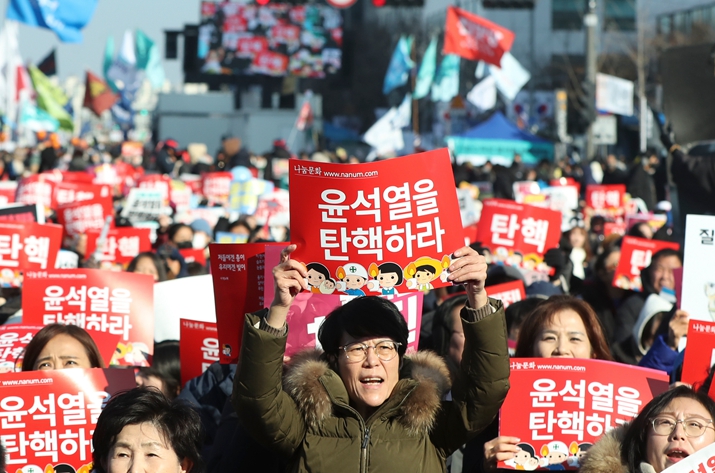
Protestors attend a rally calling for the impeachment of President Yoon Suk-yeol near the National Assembly in Seoul, the Republic of Korea, on December 14 (XINHUA)
9 Impeachment of ROK President
On December 14, the National Assembly of the Republic of Korea (ROK) approved the second impeachment motion against President Yoon Suk-yeol, just 11 days after his brief declaration of martial law sent shockwaves across the nation and the globe.
Yoon declared emergency martial law on the night of December 3 in a televised emergency address, claiming the need to eradicate "anti-state" forces and uphold free constitutional order. It was the first time martial law has been declared in the country since the late 1980s.
Yoon rescinded the decree just six hours later after it was rejected by 190 lawmakers.
Opposition parties including the Democratic Party submitted the first impeachment motion over Yoon's martial law declaration on December 4, accusing him of treason. But the motion was scrapped on December 7 as Yoon's People Power Party lawmakers refused to vote on it.
Under the ROK's constitution, the Constitutional Court must decide whether to uphold or reject the impeachment within 180 days.

Chinese astronauts, also known as taikonauts, from the Shenzhou-18 and Shenzhou-19 spaceflight missions take a group photo on China's Tiangong space station during handover on October 30 (XINHUA)
10 Breakthroughs in Space Exploration
In 2024, the world witnessed remarkable progress in space exploration.
On December 17, Chinese astronauts on the Shenzhou-19 mission completed a nine-hour spacewalk outside the Tiangong space station, conducting maintenance and inspection and installing debris protection devices. This extravehicular activity surpassed the previous global record of eight hours and 56 minutes, held by American astronauts since 2001, and set a new benchmark in China's space program.
As of December 22, American aerospace company SpaceX had launched 134 rockets last year, continuing to lead the charge in commercial aerospace innovation. This included 128 Falcon 9 missions and six Falcon Heavy launches. On March 14, SpaceX conducted the third orbital flight test of its Starship system. While the spacecraft disintegrated upon re-entry, the mission provided data that will be instrumental in advancing future Starship developments.
Copyedited by G.P. Wilson
Comments to dingying@cicgamericas.com




























